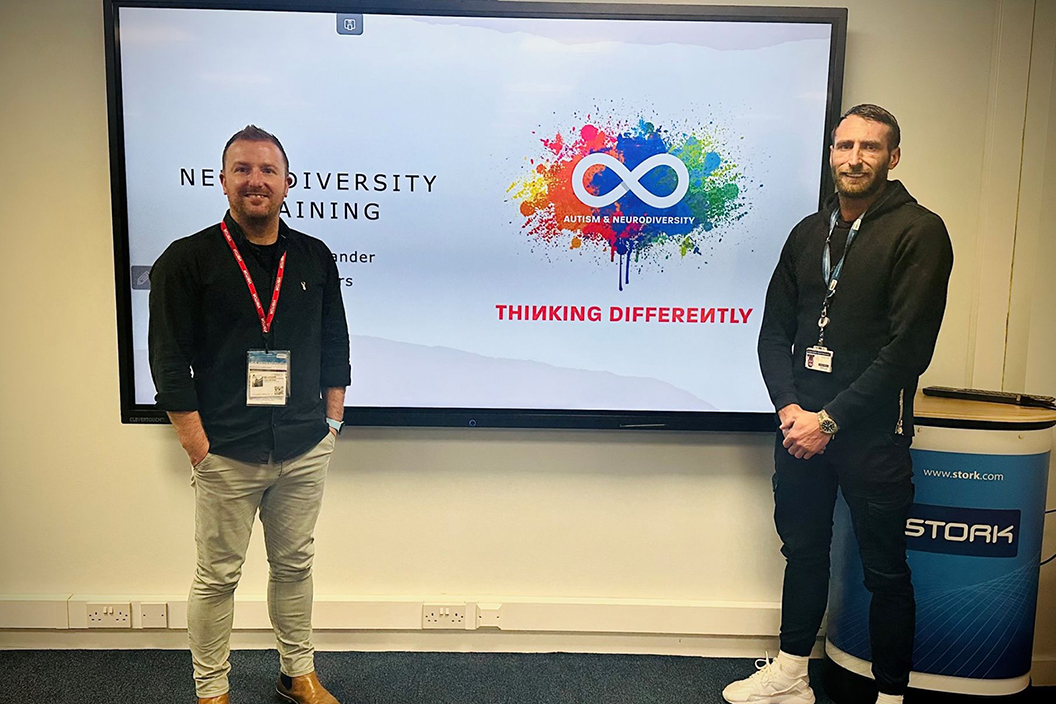20 Mar 2024
What is normal? Neurodiversity Awareness

Whatever your normal is may not be the same as someone else’s…and that’s okay. Thinking differently doesn’t mean you should suppress yourself; it means finding a supportive network that can help you flourish and be your best self. No one should feel they have to hide who they are, which is why we want to encourage open and honest conversations at Stork. The ADHD Foundation encourages employers to learn more, showa understanding, and allow a reasonable degree of flexibility, when required, in order to support individual needs and requirements.
People make our business. We need to continue to evolve and adapt our culture to support the needs of our colleagues. Each day, we learn new things and strive to foster an environment where everyone feels supported and able to be their true, authentic self. Broadening our knowledge and understanding is key to our commitment to Diversity, Equity and Inclusion.
Recently, we focussed our internal awareness efforts on the topic of neurodiversity. This important theme stemmed from one of our own colleagues, Billy Newall our Scaffold Lead, openly sharing his ADHD diagnosis. ADHD UK explain that Attention Deficit Hyperactivity Disorder (ADHD) is defined through analysis of behaviour. People with ADHD show a persistent pattern of inattention and/or hyperactivity–impulsivity that interferes with day-to-day functioning and/or development.
Billy explained: “When I came into an office environment, I was a little unsure whether to tell my line manager about my ADHD condition. I know how I like to work, which is at a pace quicker than others and that’s because my brain is wired differently. However, I didn’t want to be seen as a show off or anything negative in general. I can also be abrupt and impatient at times, so I didn’t want to come across rude and not caring. I decided to tell my team because none of the negatives are the case and I wanted them to know that they can utilise my positives if they can understand the downsides for me. After telling everyone in the team, I felt like I didn’t have to mask so much and could be myself.”
To promote neurodiversity awareness throughout our workforce Stork welcomed Billy Alexander, CEO of Autism & Neurodiversity North Scotland to our Aberdeen facility. The training delivered by Billy provided important information about neurodiversity and neurodivergent conditions, along with practical guidance and approaches that can be applied at work and in everyday life.
By facilitating a positive, judgement-free space for colleagues to share their own personal experiences, the sessions generated open conversations and emphasised our commitment to creating a workplace culture where all our colleagues can feel heard, supported and appreciated. At Stork we value that our teams are created by a fantastic and unique blend of individuals; and importantly we recognise that it’s this diversity that makes us stronger.
Billy Alexander, CEO of Autism & Neurodiversity North Scotland commented: “It has been encouraging and rewarding to work with Stork in providing neurodiversity awareness training, supporting the organisation on its diversity and inclusion journey. I must thank Billy Newall for approaching me to support Stork, as well as for his courage and strength in sharing his own experience and journey of neurodiversity with me and others.
In creating working environments that are inclusive and celebrate the power of thinking differently, not only do we support individuals to thrive, meet their full potential and want to ‘show up’ for work, we are also more likely to solve the many challenges that organisations face, no matter what industry or sector, with having people in our teams who can think differently.
Thinking differently, when provided with a supportive and psychology safe environment, produces creativity and innovation, and can often make what once felt impossible, possible.
I look forward to continuing to work with Stork in the coming months and watching individuals, and the organisation thrive in its neurodiversity journey.”
By expanding Stork’s understanding of neurodiverse conditions, we hope to encourage open minded conversations and promote a workplace culture that supports and accepts that everyone one is different.